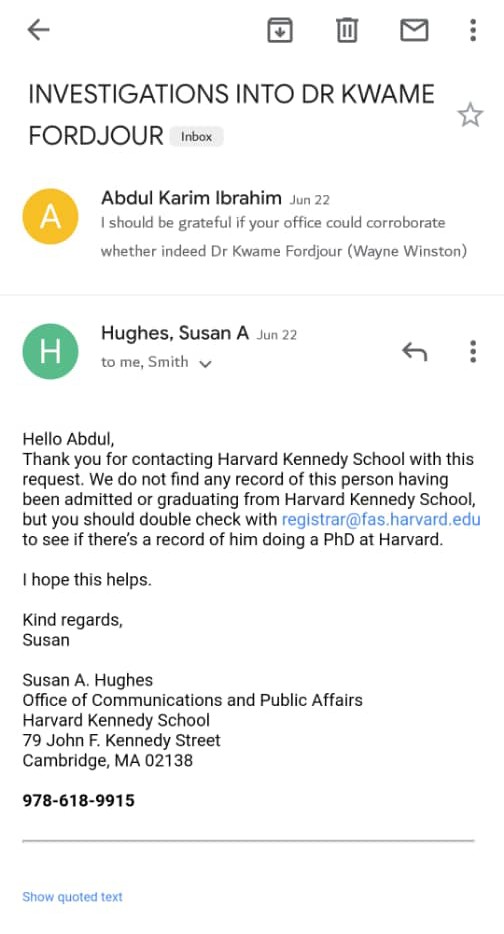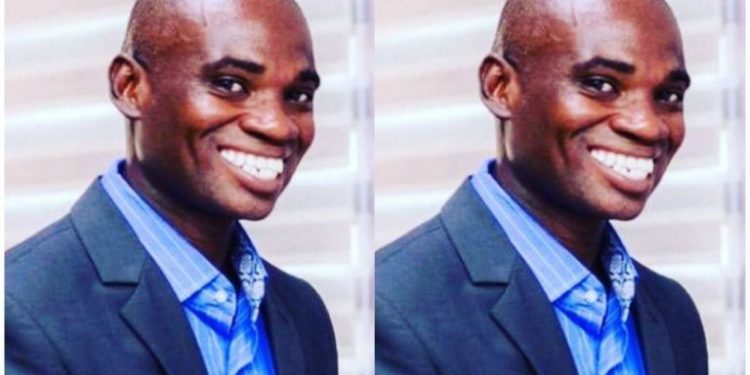Ghana’s media space has recently seen a major discussion on what many term as a “fake” award scheme that has rather become an unfolding scandal.
The conversation has centred around one man who addresses himself as H.E. Dr. Kwame Owusu Fordjour, alias Dr Wayne Winston.
Fordjour describes himself as the “Global Chair under the UNSG of the United Nations Blueprint Mission of Excellence”
He claims that the mission was “spearheaded and instituted by Former UN Secretary General Kofi Annan as the finest Global Performing Honour or Achievement Belt of Defined Service to Humanity that has Divine Cord of Global Governance, in building Nations through Peace and Prosperity, Democracy, Law and Order etc.”
The spotlight on him and his activities in Ghana comes after his “2020 Global Leadership Service to Humanity Awards” held at Alisa Hotel in Accra on Friday, August 28.
That event saw famed Ghanaians including rapper Sarkodie being given an award supposedly affiliated to the United Nations and spearheaded by former Secretary-General Kofi Annan.
More than 20 influential Ghanaians including a Member of Parliament, a University Vice-Chancellor, and many media personalities have been awarded at various ceremonies under Fordjour’s United Nations Blueprint Mission.
‘How is it fake?’
Many Ghanaians strongly hold the view that the awards are fake, despite a denial from Fordjour.
In Ghana, there is no law barring people from organizing award schemes or recognizing others involved in legal activities.
In some instances, organizers register the venture with the Registrar General’s department.
So why is there a strong view that the award is fake?
According to a researcher and journalist, Abdul-Karim Ibrahim, who started making allegations of the award’s fakeness, his conviction was based on Mr Fordjour’s incoherent statements when he appeared on Wontumi TV in June 2020 to present the said award to the owner of the media house, Bernard Antwi Boasiako, alias Chairman Wontumi, who is the Ashanti Regional Chairman of the governing New Patriotic Party (NPP).
He said while he was shocked that the UN would award Chairman Wontumi, Fordjour’s comments gave impetus to suspicions that the award was dubious.
“There was also the other issues of communication; horrible grammar, the citation was incoherent, the storyline that the winner was only 5 of 200 people selected across the world by a UN panel among others. Generally, Fordjour’s demeanour too. He didn’t cut the regular figure of someone at such high levels in diplomatic circles. This may seem a bit classist but it’s a poignant fact nonetheless,” he told Dubawa.
“I looked into his official website (UN blueprint missions) and found out the UN had no such mission. I also found out that he’d been arrested in the past over attempts to defraud,” Ibrahim added.
Indeed, a September 2010 Ghanaian Times newspaper report republished on ModernGhana.com indicated the said arrest of Fordjour over an attempt to defraud rural and community banks.
“Fordjour was alleged to have written a letter to 40 rural and community banks asking them to pay GH¢200 each as participation fee and to submit 10-minutes documentary of their projects to commence publicity on various media networks as a prelude to the event. The bank’s officials handed over Fordjour to the police when he went there in response to an invitation to come for further discussion on the project,” excerpts of the report read.
A claim of a fake award could be hinged, among other things, on a false claim of affiliation, suspicious or dubious character being the organizer and the revelation that the programme is a pay-to-get scheme. Many fake awards fall under similar activities.
The above are broad categories under which most alleged fake awards could fall.
‘Borrowed credibility’
In an attempt to inject credibility into the awards venture, the organizers sometimes tout the credentials of influential persons or organizations that are purported to be affiliated to the awards.
In most instances, this turns out to be false and was only intended to restrain the minds of doubters from raising objections.
It becomes safe to state that an award is questionable if those claimed to be affiliated to it publicly deny any such connection.
Associating former UN Secretary-General, Kofi Annan or the United Nations (UN) to award ceremonies by Fordjour would create a huge amount of credibility. But the scam was unveiled when the United Nations on September 7, 2020, denied any affiliation with Fordjour’s Blueprint Global Challenge Awards.
‘Who is the organizer’
The credibility of promoters or organizers of awards events are almost always directly related to the quality of awards.
With the advantage of the internet, looking up background record and history of organizers of awards is relatively easy. Their history could provide useful information about the credibility of their awards offering.
The news report of Fordjour’s arrest on the allegation of fraud was a major development that would prompt anyone who does a little background check to see how suspicious it was. Again Mr. Fordjour claims he is an alumnus of Havard University but the school has denied knowledge of such person as a former student.

Another detail in the ensuing conversation about fake awards is many different names under which awards at various terms were named.
‘Swinging award names’
In the 2010 news report, Fordjour was linked to what was known as “Millennium Achievers’ Gold Award.” Subsequent reportage mentioned awards given to different people under his United Nations Blueprint Mission of Excellence initiatives under various names, such as “GPE Gold Star Order of Leadership Excellence,” “UN Kofi Annan Excellence Awards”, “Blueprint Global Challenge Awards,” and “Global Leadership Service to Humanity Awards.”
While this alone cannot be a clear-cut indication of a fake award, it remains curious in the case of Fordjour that there is no record of previous editions or winners of the Global Leadership Service to Humanity Awards which was said to be the 7th edition.
Dubawa found no record of the series before what Fordjour cited as the 7th edition of the award ceremony.
‘Why pay?’
Why should there be payment if the nominee or selected person is deserving of it?
If one is meritorious of an award by reason of their personal efforts, do they need to justify that with a monetary contribution to the organizers?
Why should there be payment if the nominee or selected person is deserving of it?
The case of Fordjour’s supposed “UN Awards” may be the biggest in recent history of scams, especially in terms of the notable characters associated to the award programme and the personalities involved in the scam, particularly the high publicity it received in the media.
This development provides some useful lessons for Ghanaians and Ghana where many awards; however credible, however fake, are fast becoming commonplace.
–
Source: Jonas Nyabor
The reporter, Jonas Nyabor, produced this fact-check under the auspices of the Dubawa 2020 Fellowship in partnership with Citinewsroom to facilitate the ethos of “truth” in journalism and to enhance media literacy in the country.


Comments are closed.